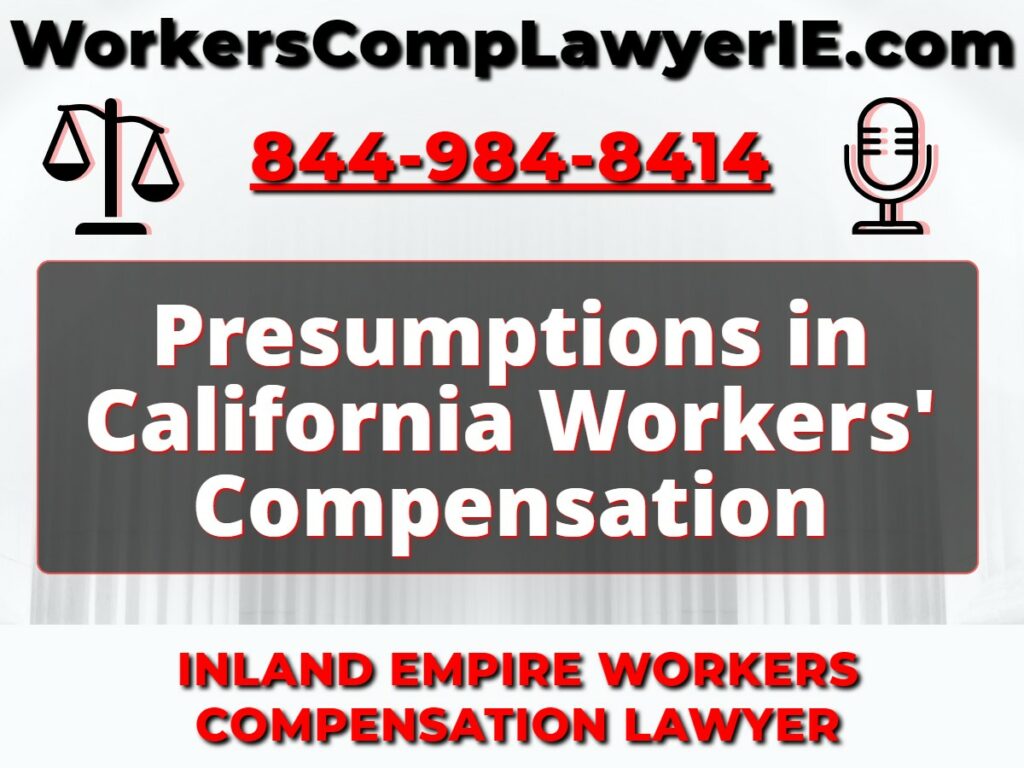Presumptions in California Workers’ Compensation

Introduction to Presumptions in California Workers’ Compensation
California is known for its comprehensive workers’ compensation system designed to protect those who have suffered injuries on the job. A crucial part of this system that often goes unnoticed is the concept of ‘presumptions.’ Presumptions can significantly impact your workers’ compensation claim, making them essential to understand. Please note that this article is intended for informational purposes only and does not constitute legal advice.
Understanding Presumptions in Workers’ Compensation
So, what are presumptions? Presumptions are pre-established assumptions applied in the legal context, particularly in workers’ compensation cases. These presumptions can work in favor of the injured employee by placing certain burdens of proof on the employer or insurance company.
In essence, presumptions streamline the claims process by reducing the need for prolonged disputes over common issues. They help ensure injured workers get the compensation they deserve promptly.
Common Presumptions in California Workers’ Compensation
Several key presumptions are utilized in California workers’ compensation cases. These include, but are not limited to:
- Presumption of Compensability: This presumes that an injury occurred at work unless there’s evidence suggesting otherwise. For instance, if you suffer a sudden back injury while lifting a box at work, it’s presumed to be work-related.
- Presumption of Industrial Causation: Certain diseases are presumed to be work-related if a worker was exposed to conditions at work that could cause the disease. For example, a firefighter exposed to smoke and chemicals developing lung disease would have this presumption.
Impact of Presumptions on Your Case
The effect of presumptions on your case cannot be understated. These presumptions can play a pivotal role in the outcome of your workers’ compensation claim.
Take, for example, a case where a worker develops a lung disease after years of exposure to harmful chemicals at work. The presumption of industrial causation would immediately shift the burden to the employer or insurance company to prove that the disease was not caused by work exposure. This shifts the odds in favor of the worker, making it easier to secure compensation.
Rebutting Presumptions in Workers’ Compensation
While presumptions generally favor workers, employers or insurance companies may try to rebut them. That means they will attempt to provide evidence contradicting the presumption. This can add an additional layer of complexity to your case and potentially impact your benefits.
Seeking Professional Help for Workers’ Compensation
Given the complexity of workers’ compensation cases and the pivotal role of presumptions, it’s often advantageous to seek professional help. Navigating the legal landscape can be daunting, but you don’t have to do it alone. By dialing WCLIE’s Injury Helpline at (844) 984-8414, you can receive a free consultation. Our professionals have extensive experience in California workers’ compensation law and are ready to assist you.
Conclusion to Presumptions in California Workers’ Compensation
Presumptions play a significant role in California’s workers’ compensation system, influencing how cases are decided and benefits are awarded. They are a crucial aspect of this area of law that all injured workers should understand.
If you’ve been injured at work, remember you have rights, and professional help is available. At WCLIE, we’re dedicated to helping injured workers navigate the complexities of their claims. Don’t hesitate to reach out for a free consultation at (844) 984-8414. Our seasoned professionals, with their extensive experience in workers’ compensation cases, are ready to assist you in securing the compensation you deserve.
